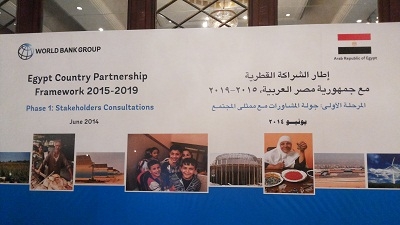These discussions comprised the first phase of consultations held by the World Bank Group ahead of drawing-up its new Country Partnership Framework strategy for 2015–2019. The joint strategy involves three World Bank Group institutions, namely the World Bank, the International Finance Corporation (IFC), and the Multilateral Investment Guarantee Agency (MIGA).
The consultations, which started with government representatives in early March, were followed by three meetings held throughout the month of June with Egyptians from civil society and youth organizations, rural development societies, academia and the private sector, in Cairo, Alexandria, and Aswan.
This is the first time direct consultations with a broad range of Egyptians from outside official institutions have been held. A website has also been created with a survey aimed at collecting feedback.
“The Country Partnership Framework is the road map that spells out how the World Bank Group will support Egypt over the coming years,” said Hartwig Schafer, Country Director for Egypt, Yemen, and Djibouti. “We are collecting ideas, opinions, views and suggestions. Contributions from those who know the country best will help us shape the strategy.”
In Cairo, the audience was diverse, with more than 100 participants. Education, social welfare, energy, agriculture and health ranked high on their agenda. In Alexandria—where most participants were young—the list was the same, though they added private sector development. Participants in Aswan were of more or less the same opinion, adding infrastructure and fisheries, minerals and tourism.
Examples of the contributions included Ahmed Okasha of the Mubadra Center in Alexandria, who emphasized: “Egypt faces challenges to elementary education, the need for the development of teachers and the curricula, and changing the culture of the community.” Mohammed Hani Al-Sebaa’i, a founder of Al-Hassan Foundation for Spinal Cord Injuries, chose the health service. “Disability issues should also be the center of our attention.”
Aswan was chosen intentionally by the World Bank Group to mark the first round of consultations as Upper Egypt is underdeveloped.
"The consultations form a key part of determining the World Bank Group’s priorities in Egypt over the next five years,” said Nada Shousha, IFC Country Manager for Egypt, Libya and Yemen. “It was refreshing to hear from different groups—ranging from academia and civil society to the government and private sector—on what we should be focusing on to help Egypt in its transition."
A second round of consultations is scheduled to be held ahead of the launch of the new Country Partnership Framework next year.
Currently, the World Bank’s portfolio in Egypt embraces 25 projects worth US$4.9 billion, as well as 43 trust fund grants worth US$190.2 million. The Bank finances projects to speed the delivery of services linked to key needs, such as energy, transport, water and sanitation, agriculture, irrigation, education and health.
The value of the IFC’s investments reached US$1 billion in December 2013, making Egypt its largest portfolio in the Middle East and North Africa region. It has put money into capital markets, chemicals, oil and gas, agricultural industries, manufacturing and health care.
In 2013, MIGA extended a US$150 million guarantee to help reinsure the US Apache Corporation, which in response to Egypt’s growing domestic demand, is involved in the exploration, development and production of crude oil and natural gas.

